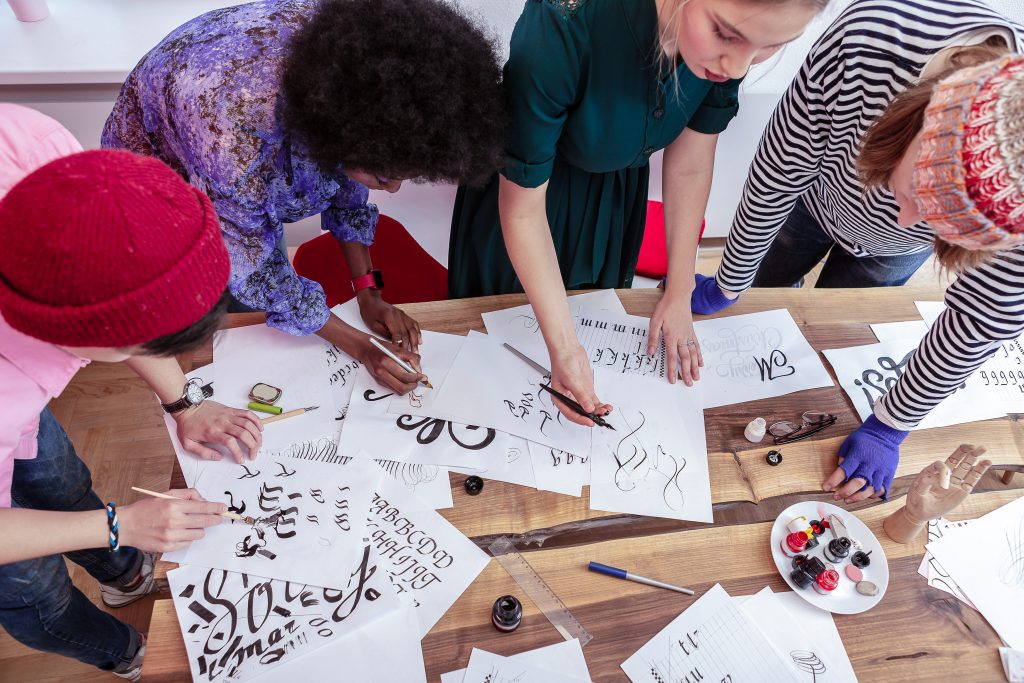Peer-to-Peer Activity: Inspiring
Overview
Participants view and share examples of artistic expression from within their local culture that captures aspects of the commitment of equal treatment.
Competencies

- Participants defend a respectful and impartial approach to all religions and beliefs.
- Participants articulate the importance of equality for everyone.
- Participants share artistic examples and articulate how they apply to Commitment IV.
Step-by-Step Instructions
Discussion Questions
Resources
Facilitator Tips
Faith Quotes
Step-by-Step Instructions
INTRODUCTION
- Facilitator presents an artistic expression that captures aspects of Commitment IV. (The example is selected in advance to the session.)
- Examples of cartoons, calligraphy, and music can be found under the Resources tab. Images related to Commitment IV are shown below.
- Participants may be given the opportunity to locate their own examples via the internet.
- If time allows, participants may create their own artistic expressions related to Commitment IV. In this case, facilitator should arrange in advance for art supplies.
DISCUSSION
- Participants are given time to view and interpret the artwork.
- They may choose to write down their impressions. (They may use their Faith for Rights notebooks, if provided.)
- Participants discuss the significance of the artwork and how it relates to the aim of Commitment IV of equal treatment.
- Questions under the Discussion Questions tab may be used to stimulate discussion.
CONCLUSION
- Participants may consider how artwork can increase understanding between people of different religious or cultural backgrounds.


Discussion Questions
- How can identifying artwork or music from various faiths enable you and others to become defenders of a respectful and impartial approach to all religions and beliefs?
- How can appreciation for artistic work engender positive feelings toward members of other faiths or belief systems?
Resources
- Cartoons to illustrate the Universal Declaration of Human Rights
- Music for Commitment IV, Ursula Loizides (flute) and Michael Wiener (piano). This file can be downloaded from SoundCloud prior to the session.
- 18 Commitments Calligraphy Poster
Facilitator Tips
If this activity is expanded for participants’ original art expression, advanced planning may be required to collect or purchase art materials (such as paper, colored pencils, paint brushes, clay, scissors, etc.). A sponsoring faith group may be able to provide these materials, or you may need to notify participants in advance about bringing their own supplies.
Additional Tips for All Peer-to-Peer Activities
- The #Faith4Rights modules are flexible and require adaptation by the facilitators before their use. Case studies related to peer-to-peer exercises in the 18 modules need to be selected by the facilitators from within the environment where the learning takes place. The #Faith4Rights toolkit is a prototype methodology that requires contextualization, based on the text of the 18 commitments, context, and additional supporting documents.
- Not all issues raised need to be resolved. This would be an impossible and even a counterproductive target. The aim is rather to enhance critical thinking and communication skills, admitting that some questions could receive many answers, depending on numerous factors.
- Tensions may occur during discussions related to “faith” and “rights.” Most of these tensions are due to human interpretations. Learning sessions are spaces for constructive dialogue in a dynamic process where tensions can be reduced with the help of clear methodologies, including pre-emptive situation analysis and evidence of positive results in areas of intersectionality between faith and rights.
- When preparing the sessions, facilitators need to factor in the profile, age, and backgrounds of participants. Focused attention on the learning objectives can transform tensions into constructive exploration of new ideas.
- Meaningful engagement requires democratically pre-established rules. Facilitators should dedicate time with participants to elaborate these rules together at the outset and act all along the training as their custodians.
- The time frames suggested in this #Faith4Rights toolkit are merely indicative. Facilitators may adapt them freely to suit the needs of their group of participants. The key balance is between respecting the overall time frame while not cutting short a positive exchange momentum.
- To ensure optimal and sustainable benefit, facilitators may create a “training notebook” for participants during their peer-to-peer learning sessions. It would contain a compilation of templates to help participants keep track of what they have learned throughout the program and eventually use this notebook as their personalized follow-up tool.
- When technically feasible, facilitators are also advised to project the module under discussion on screen in order to alternate between discussions thereon and showing the audio-visual materials listed in each module or any other items selected by the facilitator.
Faith Quotes
“Then Peter began to speak: ‘I now realize how true it is that God does not show favoritism.’” (Acts 10:34)